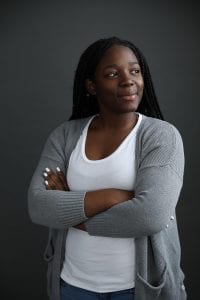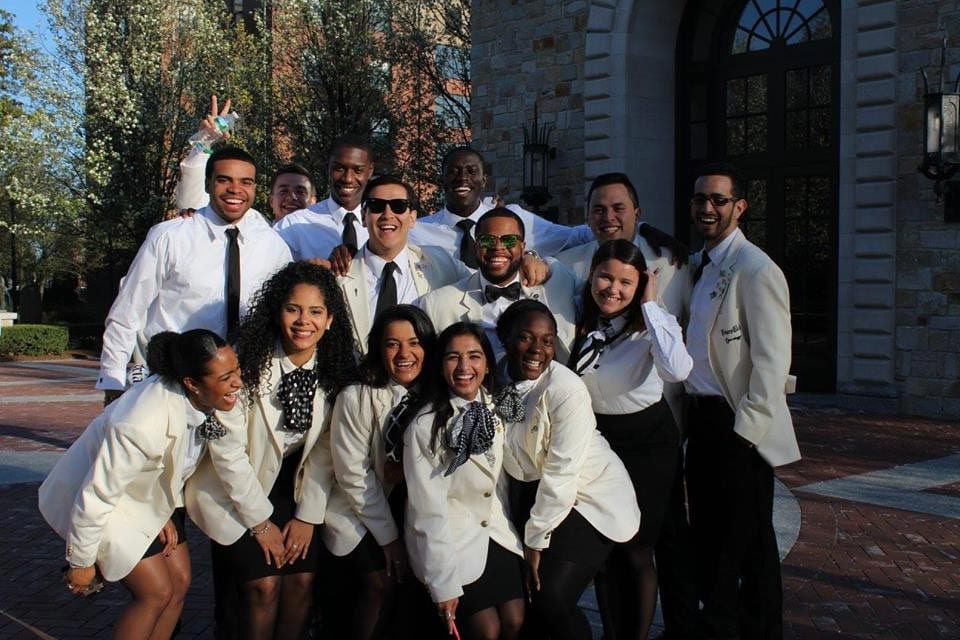May 19, 2017
Persistence was key for science major Shantal Solomon ’17
By Vicki-Ann Downing
Persistence was the key for Shantal Solomon ’17 (Boston, Mass.), who will graduate with a double major in biology and psychology and a minor in neuroscience.
Solomon grew up in the city’s Mission Hill neighborhood. For high school, she attended Boston Community Leadership Academy, one of the smallest public high schools in Boston. It offered a rigorous college preparatory program with college acceptance as a graduation requirement. Students were nurtured to be future leaders, and their capstone courses required service in the community.

Solomon excelled there, graduating among the top five in her class, and played varsity basketball for Brighton High School and New Mission High School while attending the leadership academy.
A guidance counselor recommended that she apply to Providence College. In her extended family, she is only the fourth person to complete a college education, along an uncle and two cousins. Her decision about where to go to school was purely financial. PC offered her a scholarship in biochemistry, her intended major, and she liked the campus when she visited.
Her social adjustment wasn’t a problem. Solomon made friends. But the classroom experience was a different story.
“The classes were really hard,” Solomon said. “It was a big shock. I did so well in high school. It was pride. I’d never struggled like this in my life. I thought it was my fault. It was tough for me.”
“Right away, people — not just professors, but everybody — told me my major was too difficult, choose something easier,” Solomon said. “But I wanted to be a doctor. I wanted to go to medical school.”
Solomon thought seriously about dropping out of school or transferring. But instead, she made adjustments. She continued to major in science, but switched from biochemistry to biology, then added a second major in psychology and a minor in neuroscience. She sought tutoring help in the Office of Academic Services and continued it through her senior year.
She began to understand that her past academic experience, strong as it was, did not prepare her to compete with peers who attended high schools that offered more science courses, even Advanced Placement courses, which were unavailable to her.
“I went to one of the best public schools in Boston, and there were still things we didn’t have access to,” said Solomon.
During her first year at PC, Solomon went home to Boston every weekend to work long shifts in the Niketown retail store on Newbury Street. That wasn’t conducive to studying, so in her sophomore year, she took a work-study job on campus, signing students in and out of residence halls.
Staying on campus allowed her to join more activities. She played intramural basketball, then joined the women’s basketball club team, which competes around New England. She played as a guard and served as the club’s vice president. She also joined the Board of Multicultural Student Activities and became active on its Diversity Committee, which brings diverse programming, activities, and guest speakers to the campus community.
In her sophomore year, Solomon reapplied to be a member of Friars Club, the premier service organization at PC. Its 75 members, chosen after interviews, wear distinctive white jackets as they lead campus tours for prospective students and their families, volunteer at events such as commencement and Alumni & Family Weekend, serve as honor guards at funerals, and perform service around Providence.
Solomon applied her first year but wasn’t chosen. She was successful in her second attempt, and it opened a new world to her.
“I met science majors. I met other students of color,” Solomon said. “Friars Club is one of the reasons I stayed at PC.”
She mentioned Victoria Timmel ’17 (Smithtown, N.Y.), one of three valedictorians of the Class of 2017, and Charles D’Alessandro ’17 (Franklin Square, N.Y.) as science majors in Friars Club who inspired her.
When she gives campus tours, “I tell students that pain is only temporary. Believe in yourself and have confidence,” Solomon said. “It’s me being honest. They can appreciate it.”

Solomon also found a new academic adviser in Dr. Brett J. Pellock, associate professor of biology. She never had him for a class, but she noticed that he had a nice way of interacting with students. She asked if he would be her adviser, and he agreed. He became a sounding board and offered her encouragement.
“It was always a bright moment when she would stop by and let me know how she was doing,” said Pellock. “It was impressive how persistent she was in her studies, how much effort she put in, and the sacrifices she had to make.”
In her first psychology classes, Solomon began to discover her career goal, to become a pediatric psychiatrist. She realized that in the inner-city world in which she was raised, mental illness was a stigma. No one mentioned it — and that needed to change.
“We don’t talk about mental illness,” said Solomon. “The message was always that you just have to be strong. I was taught to survive. I’m happy I was taught it, but I wish I had been told it was OK to be emotional, OK to be sad. I’m very affectionate.”
Solomon isn’t Catholic — she attends a Baptist church — but when she heard about the Campus Ministry immersion trip to Jamaica to work with mentally and physically disabled children and pregnant teens through Mustard Seed Communities, she signed on.
Friends in Friars Club then encouraged her to apply for a Father Philip A. Smith, O.P. Fellowship for Study and Service Abroad. The program’s purpose is to introduce PC students to the service work done by Dominican friars and sisters in all corners of the world.
After a detailed and selective application process, Solomon was named one of 10 fellows for the summer of 2016. She was accepted to travel to Trinidad and Tobago for seven weeks to work with the Dominican Sisters of St. Catherine of Siena, who operate an orphanage and youth center for mentally and physically abused children in Etrepagny.
But just days before Solomon was to depart, her cousin David was shot and killed walking between her grandmother’s house and his own. He was 22.
“My friends from Friars Club were texting me saying, ‘You must be excited, good luck on your trip,’ and I was texting back that I wasn’t going,” said Solomon. “They were saying, ‘This is something you have to do. Your cousin would want you to go. You’ll never get an opportunity like this again.’ I did go. I missed his funeral.”
It was the first time that Solomon had traveled alone outside the country. She worked with children in classrooms, observed social workers, and attended lectures about medication and pediatric psychiatry.
“It was the greatest experience I will take away from Providence College,” said Solomon. “The people I met there, and the exposure to the culture. It was my first time not worrying about finances. The fellowship paid for everything for seven weeks.”
The memory of her cousin “is what gets me out of the bed in the morning,” said Solomon. “Even now I live with the motivation that I’m doing what I do for him.”
She will walk across the stage at the Dunkin’ Donuts Center to receive her diploma on May 21, two days after the one-year anniversary of his death. She will cross the stage for both of them, knowing that he died before he had the opportunity to pursue his goal of returning to school.
Solomon credits her roommate and friend, Jaida Judge ’17 (Dorchester, MA), an elementary and special education major and Spanish minor, with helping her to stay on track.
“Every time I doubted myself and wanted to give up, she picked me up, encouraged me, and told me that quitting wasn’t an option, and that us inner-city kids were destined for greatness,” Solomon said.
After graduation, Solomon will work while applying for academic-enhancing master’s degree programs to prepare her for medical school. She attended a session at the Alpert Medical School at Brown University that discussed non-traditional ways to attend medical school, aimed at increasing the number of people of color who become doctors.
“It was refreshing to see people of similar backgrounds and how they got to medical school,” Solomon said.
On the first day of her neuroscience capstone with Dr. Thomas J. Guilmette ’78, professor of psychology, Solomon looked around the room and realized she was the only student of color there. Her eyes filled with tears of pride. She realized she had accomplished what she set out to do even when others told her she could not.
Solomon said she is most proud of “my growth in the classroom and outside the classroom.”
“They were some of my best days and some of my worst days, but I wouldn’t change anything in the world,” Solomon said. “Academically, I didn’t do as well as I wanted to do, but just to see the progress in myself, freshman to senior year, I’m satisfied. I know that I can do what I want to do. I’m just excited and grateful for the unconditional love and sacrifices my mother made that allowed me to attend and graduate from Providence College.”





